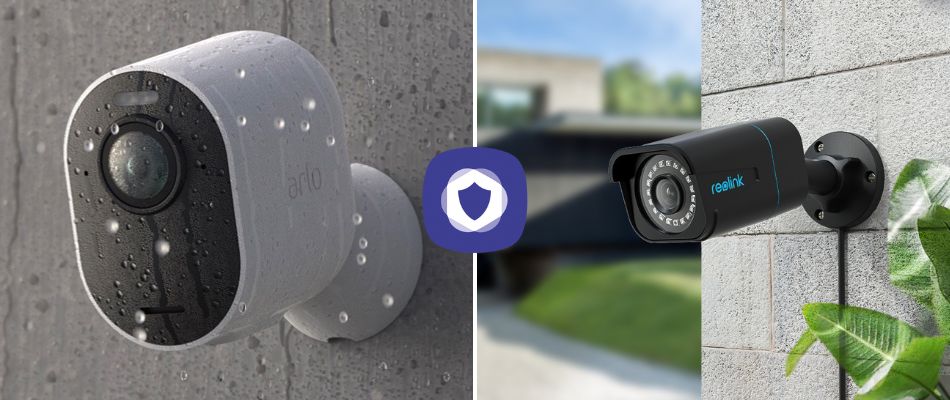Every day more Americans upgrade their home security systems, and the security market has expanded exponentially in the last ten years. But it can be hard to know which provider is best for you. Arlo and Reolink are two great but very different security providers. Arlo was launched in 2014, focusing on high-resolution cameras, DIY equipment, and smart home capabilities.
Reolink launched in 2009 and focused on high-quality camera systems for home and business use. Reolink offers environmentally friendly solar-powered products for home use. Let’s take a look at what they can do for you.
Arlo vs Reolink: What do they have in common?
- Mobile app: You can manage your security system and monitor your cameras via a mobile app. The apps are available on iOS and Android.
- Flexibility: You can purchase your cameras without signing contracts or subscriptions; extras are optional.
- Self-monitoring: There’s no monitoring service offered.
- Battery-powered: Many Arlo and Reolink cameras are battery-powered, reducing reliance on wires and other power sources.
- Outdoor security cameras: Reolink and Arlo offer outdoor cameras, keeping all areas of your home safe.
- Night vision: You’ll have access to crisp color night vision that keeps your home or business safe at night.
Arlo vs Reolink: What are the differences?
- Long–range cameras: Reolink’s cameras offer an impressive range; the PoE (power over ethernet) camera can see for up to 200ft. In addition, some cameras have 5x optical zoom. Arlo doesn’t offer these impressive features.
- Storage options: Arlo relies on cloud storage, but Reolink offers more options for local storage, including MicroSD card and NVR (Network Video Recorder) systems.
- Resolution: Reolink cameras are high-quality but only reach 1080p HD resolution; Arlo’s HD ultra camera offers 4k resolution.
- Advanced motion detection: Arlo offers advanced motion detection, including person detection. Reolink doesn’t.
- Smart home automation: Reolink’s smart home integration is disappointing; only a few cameras offer compatibility with Amazon Alexa. Arlo has better smart home functionality.
- Battery life: Reolink’s rechargeable battery cams have better battery life.
- Security system size: Arlo is ideal for domestic users looking for a few security cameras; Reolink can provide larger NVR systems for a business or larger property.
Reolink – What you need to know
Reolink launched in China in 2009 to offer smart security cameras, they focus mainly on PoE, IP (Internet Protocol), NVR, and Wi-Fi Security cameras, and they launched the first battery-powered IP camera.
Installation
The installation process varies, it can be as easy as scanning a QR code, but you may have to complete additional mounting. The wire-free cameras don’t require extra drilling or hardwiring. NVR systems can be more challenging, but there’s no professional installation, which is something to consider.
Equipment
Reolink mainly focuses on cameras, so they have an impressive array, including NVR, PoE, and floodlight cameras. Popular cameras include:
- Reolink Argus PT
- Reolink Argus 2
- Reolink Argus 3 Pro
The most popular cameras offer weatherproofing, high-quality (1080p) video resolution and typical features. The Reolink solar panel is a great product that provides power for your wireless security cameras.
Home automation
Reolink offers a decent app that can send you push notifications if there is an issue, but they don’t have much else on offer. There are minimal third-party integrations; some cameras have basic compatibility with Amazon Alexa and Nest.
Costs
What you’ll pay varies, there aren’t many bundles offered, but cameras start at around $70. There are some subscription services provided if you want additional storage or cameras.
- Basic monthly plan: $0, including seven days of video and 1GB of storage for one camera
- Standard monthly plan: $3.49, 30-day cloud storage, five cameras, 10 GB cloud storage
- Premier monthly plan: $6.99, 30-day cloud video history, ten cameras, 40 GB cloud storage
- Business monthly plan: $10.49, 60-day cloud video history, 30 cameras, 100 GB cloud storage
Nerd pros
- Pricing: Reolink’s pricing is affordable. You’ll usually pay less than $100 per camera.
- Warranty: Reolink offers a two-year warranty.
- Simple installation: Many installations can be completed by scanning a QR code.
- Power options: Multiple power options are offered, including solar panel batteries.
Nerd cons
- Lack of smart home options: Reolink isn’t the most advanced smart home provider.
- No professional monitoring: Reolink doesn’t offer professional monitoring; only motion-activated notifications exist.
- Limited general capabilities: It was disappointing that the available capabilities were limited. Many standard features, such as person detection, Geofencing, etc., were missing.
Arlo: What you need to know
Arlo is a modern provider of home security, offering DIY home security. Arlo offers simple installation and a well-rated app. Arlo was launched in 2014 and is based in San Jose, California. They were initially a subsidiary of NetGear but became independent in 2018.
Installation
The DIY install process is easy and can be done in a couple of minutes, the video doorbell is the easiest to set up, but the other products are simple, too. The mobile app will walk you through each step. There’s no professional installation offered, but you won’t miss it.
Equipment
Arlo doesn’t offer some of the critical components of a smart home security system, but they do offer a variety of products, including:
- Arlo Ultra HD cameras
- Arlo Pro 2
- Video doorbells
- Arlo Pro 3
- Baby monitors
- Arlo Pro 4
Some Arlo cameras offer 4k resolution, a 180-degree field of view, and cutting-edge de-warping technology.
Home automation
The new “Works With Arlo” app promises more smart home options. Arlo integrations include Wink, Telguard, Apple Homekit, Google Assistant, and Amazon Alexa. Arlo also provides doorbell cameras, baby monitors, and a streamlined app.
Costs
Arlo offers various pricing options, with discounts for buying in bulk. Arlo offers doorbell cameras for around $80, and typical security cameras start from $129. If you pre-plan your purchases, you can access a hefty discount.
Nerd pros
- Smart item detection: Arlo cameras offer advanced item detection that can differentiate between people and animals, notifying you based on what it sees.
- Brilliant video quality: Arlo’s camera options have HD video quality, with at least 1080p HD resolution. The Ultra has 4k resolution, which is something most companies can’t offer.
Nerd cons
- Battery life: Arlo doesn’t have the best battery life compared to some competitors, which is a shame since they offer so much battery-powered equipment.
- Limited equipment: Reolink offers more equipment, including NVR systems.
Arlo or Reolink?
Reolink is a better provider if you’re looking for a larger security system, you can purchase a quality NVR system for a competitive price, but they’re pretty average regarding typical home security. Their solar panel is a unique offering. Arlo offers more, with a better app, higher video resolution, higher-quality home security cameras, and IFTTT (If This Then That) compatibility.
Get Arlo cameras Get Reolink cameras
This article has been reviewed and approved by Officer Banta.

Officer Banta is the official SecurityNerd home security and safety expert. A member of the Biloxi Police Department for over 24 years, Officer Banta reviews all articles before lending his stamp of approval. Click here for more information on Officer Banta and the rest of our team.

